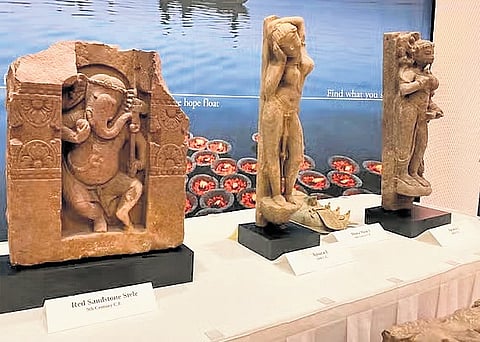House panel moots ‘Heritage Repatriation Fund’
NEW DELHI: A parliamentary panel has suggested public-private partnerships to support efforts for repatriation of antiquities, which were stolen and smuggled out of the country.
In its latest report presented in Parliament, the Department-related Parliamentary Standing Committee on Transport, Tourism and Culture stated that the government could establish a ‘Heritage Repatriation Fund’ that accepts contributions from corporations, wealthy individuals, and the Indian diaspora to support legal challenges, negotiate purchases and also to fund transportation and conservation of returned artefacts.
The panel chaired by Janata Dal (united) MP Sanjay Kumar Jha recommended investment in cutting-edge technological tools for provenance research and authentication of cultural objects for strengthening legal arguments for repatriation.
“India should invest in cutting-edge technological tools for provenance research and authentication. Advanced imaging techniques, DNA analysis of organic materials, and AI-powered databases could help establish the Indian origin of disputed artifacts and track the chain of ownership. This evidence could prove invaluable in making compelling cases for return, particularly for items with unclear provenance records,” read the report.
With the renewed efforts of the Centre, the repatriation of antiquities has increased drastically in five years. Since 2014, the Centre has brought 642 antiquities from various countries such as Australia, France, and the UK, while the majority of them have come from the US. Only 13 objects could be fetched till 2014. Between 2020 and 2024, a total 610 cultural objects, including precious idols and sculptures were returned.
So far, about 588 antiquities have been brought back from the US and 297 of them were received in 2024. The Government has also signed a Cultural Property Agreement (CPA) with the USA to prevent smuggling of Indian antiquities.
The panel also stated that India should leverage its growing economic and diplomatic influence to negotiate cultural property agreements with more countries, similar to the recent pact with the US. “These agreements should establish clear mechanisms for identifying looted artifacts and facilitating returns. Attention should be paid to former colonial powers, where many significant Indian treasures remain. These agreements 24 could be tied to broader diplomatic and trade relationships, creating incentives for cooperation on repatriation issues,” the panel said.
It also suggested formation of a dedicated ‘Heritage Recovery Task Force’, comprising diplomats, legal experts and art historians and said that the proposed multi-disciplinary team will identify, document, and pursue claims for stolen Indian artifacts worldwide.

